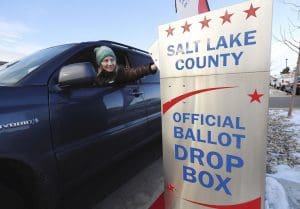States that ditched caucuses see massive increase in voter turnout
One state saw a 500% increase in turnout after switching from a caucus to a primary.

A trio of Super Tuesday states saw massive increases in voter turnout after switching from a caucus in 2016 to a primary in 2020 — dealing yet another blow to the future of caucuses in Democratic presidential primaries.
Colorado, Minnesota, and Utah all held primaries Tuesday night, after holding caucuses in 2016. And all three states saw voter turnout more than double, according to election results.
Colorado saw the largest increase after abandoning its caucus and opting for a primary, with at least a 500% jump in turnout.
In 2016, 122,296 voters turned out for the state’s caucus. In 2020, at least 756,904 people cast ballots in the state’s primary — a number that’s poised to grow, as just 82% of Colorado’s precincts were reporting results as of the time this article published.
Minnesota also saw a 289% turnout jump after forgoing a caucus for a primary.
In 2016, 191,647 people turned out for Minnesota’s Democratic caucuses. Meanwhile, in 2020, 745,072 people cast ballots in the Democratic primary, with 99% of precincts reporting.
Utah also saw its turnout more than double after opting to hold a primary rather than a caucus.
At least 175,109 people voted in Utah’s primary in 2020, a number that will certainly grow as just 28% of precincts were reporting. In 2016, just 77,344 voters turnout out for Utah’s caucuses. That means Utah saw at least a 126% increase in 2020.
Voter turnout increases were first reported by Democratic strategist Matt Ortega.
Caucuses have long faced criticism for excluding people including workers who cannot get time off to attend, parents and caregivers who cannot leave children or other family members alone, and ill or disabled people who cannot leave their homes to spend hours at a caucus.
And after Iowa’s 2020 caucuses were marred by chaos, the system faced even more criticism.
New rules adding multiple alignments and how delegates were awarded already made the caucuses more complicated.
But that complicated process was made worse by a faulty results reporting system, in which a new app malfunctioned and led to chaos.
The problems with Iowa’s caucuses led Nevada — which also held a caucus instead of a primary — to scramble to prevent a similar scenario. While Nevada’s caucus turnout broke records, it was still a fraction of the eligible voting population in the state.
After the Nevada caucus, Harry Reid, the former Senate Democratic leader from that state, said “all caucuses should be a thing of the past.”
“I believe it’s time for the Democratic Party to move to primaries everywhere,” Reid told the New York Times.
Other top Democratic figures have called for the end of caucuses, including Democratic National Committee Chair Tom Perez, who said that Democrats should abandon caucuses in the next presidential election.
Ultimately, Super Tuesday’s turnout increases among states that abandoned caucuses will give Perez and other opponents of caucuses even more ammunition to fight for such a change for 2024.
Published with permission of The American Independent Foundation.
Recommended

New NC GOP chair flirts with bogus stolen election conspiracies
Simmons predecessor was a staunch 2020 election denier
By Jesse Valentine - April 19, 2024
Texas activists pushed abortion restrictions in NM cities and counties, records show
Emails reveal influence and control in exchange for promises of legal help
By Austin Fisher, Source NM - March 04, 2024
Cannabis workers across Missouri begin push to unionize dispensaries
The first day was a breeze. Sean Shannon and Danny Foster walked into several marijuana dispensaries around Missouri with their matching “Union For Cannabis Workers” shirts and talked to employees about the possibility of unionizing. “The first day, there were 57 stops amongst the teams,” said Shannon, lead organizer with UFCW Local 655, which actually […]
By Rebecca Rivas - December 04, 2023










































































